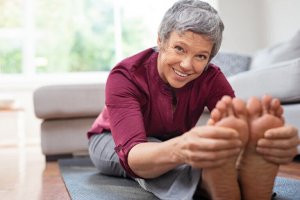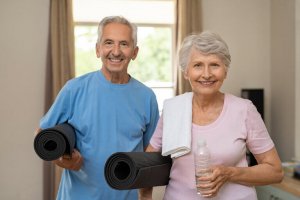Can Exercise Improve Your Immune Response?

The coronavirus pandemic has disrupted daily life and has likely led to you asking a lot of questions. One of those is whether or not exercise helps to improve your immune response? Now that we’re all confined to our homes under the threat of infection, answering this question is more relevant than ever before.
COVID-19 is a strain of the coronavirus that began its journey following an epidemic in the Chinese city of Wuhan. It rapidly expanded worldwide. Many countries have obliged their citizens to stay in quarantine, and others have imposed strict controls on the freedom of movement.
The recommendation for the entire world right now is to stay home. Authorities want to reduce the circulation of people in order to reduce the circulation of the virus itself. By doing this, they hope to buy time without too many positive cases collapsing health systems and their capacities to treat patients.
Because of this rare and dire situation, the internet is now filled with suggestions on what people can do to improve their immune responses. One of the most recommended things to do is to exercise inside your home.
So let’s look at some of the reasons behind this recommendation, and figure out how effective it really is. Can it improve the immune system? Let’s look at the theory first.
Exercise as a way to improve your immune response: theories
The effect of exercise on the immune system isn’t totally clear. Most people would think that it’s protective in nature, but this isn’t always an obvious correlation.
Many benefits of exercise appear when people do it regularly and at a moderate intensity, but not always. And while there are cases in which exercise improves people’s immune responses, it’s essential to know how to do this exactly.

One theory is that exercise helps with the circulation of white blood cells. When you move your body more, they can move to the necessary places more easily to defend against pathogens.
Another theory points to the changes in body temperature. Exercise causes immediate increases in the body’s temperature because of the excess of energy released. This mimics the same action of a fever when you’re infected with something.
Finally, the third theory proposes that the benefit is really in the reduction of stress. Exercise decreases the secretion of hormones linked to stress, and this benefits the immune system. As you’ll read later, this theory would explain too why intense exercise is actually counterproductive for your immune response.
What’s the immune response in different kinds of exercise?
There are two ways to exercise: moderately, or intensely. Moderate exercise is that which is performed for 30 to 40 minutes, perhaps every other day. Intense exercise is prolonged, with few rests.
Moderate exercise is where you’ll find the best opportunities to improve your immune response. The body produces stimuli that reproduce and cause an immune response as compensation for the energy spent. If you keep it up, the immune system will become stronger and stronger.
With high-intensity exercise, however, it’s the opposite: this type of exercise is stressful, even if you’re enjoying it. Stress, in this case, comes from the effort the body is putting forth during training.
The final result of this is a suppressed immune system, something you definitely don’t want. The theory behind this is that white blood cells migrate to the muscle tissue to repair fatigue instead of taking care of infections.

How can I exercise to improve my immune response?
With the world as it is right now, in the middle of a pandemic that obliges all of us to stay home, it’s clear that moderate exercise is the way to go. It won’t cause an immediate improvement of your immunity to COVID-19, but it’s a good way to get through quarantine.
Along with exercise, you’ll need to control your eating habits to help your immune system, too. A balanced diet, even though you’re in confinement, is very important. The same is true for getting enough rest, something we should be doing on more or less the same schedule as before.
Conclusion
You definitely won’t generate immediate super-power immunity to the coronavirus, but physical activity does help you to focus and stay busy. It might even help you to maintain an exercise routine after it’s all over!
The coronavirus pandemic has disrupted daily life and has likely led to you asking a lot of questions. One of those is whether or not exercise helps to improve your immune response? Now that we’re all confined to our homes under the threat of infection, answering this question is more relevant than ever before.
COVID-19 is a strain of the coronavirus that began its journey following an epidemic in the Chinese city of Wuhan. It rapidly expanded worldwide. Many countries have obliged their citizens to stay in quarantine, and others have imposed strict controls on the freedom of movement.
The recommendation for the entire world right now is to stay home. Authorities want to reduce the circulation of people in order to reduce the circulation of the virus itself. By doing this, they hope to buy time without too many positive cases collapsing health systems and their capacities to treat patients.
Because of this rare and dire situation, the internet is now filled with suggestions on what people can do to improve their immune responses. One of the most recommended things to do is to exercise inside your home.
So let’s look at some of the reasons behind this recommendation, and figure out how effective it really is. Can it improve the immune system? Let’s look at the theory first.
Exercise as a way to improve your immune response: theories
The effect of exercise on the immune system isn’t totally clear. Most people would think that it’s protective in nature, but this isn’t always an obvious correlation.
Many benefits of exercise appear when people do it regularly and at a moderate intensity, but not always. And while there are cases in which exercise improves people’s immune responses, it’s essential to know how to do this exactly.

One theory is that exercise helps with the circulation of white blood cells. When you move your body more, they can move to the necessary places more easily to defend against pathogens.
Another theory points to the changes in body temperature. Exercise causes immediate increases in the body’s temperature because of the excess of energy released. This mimics the same action of a fever when you’re infected with something.
Finally, the third theory proposes that the benefit is really in the reduction of stress. Exercise decreases the secretion of hormones linked to stress, and this benefits the immune system. As you’ll read later, this theory would explain too why intense exercise is actually counterproductive for your immune response.
What’s the immune response in different kinds of exercise?
There are two ways to exercise: moderately, or intensely. Moderate exercise is that which is performed for 30 to 40 minutes, perhaps every other day. Intense exercise is prolonged, with few rests.
Moderate exercise is where you’ll find the best opportunities to improve your immune response. The body produces stimuli that reproduce and cause an immune response as compensation for the energy spent. If you keep it up, the immune system will become stronger and stronger.
With high-intensity exercise, however, it’s the opposite: this type of exercise is stressful, even if you’re enjoying it. Stress, in this case, comes from the effort the body is putting forth during training.
The final result of this is a suppressed immune system, something you definitely don’t want. The theory behind this is that white blood cells migrate to the muscle tissue to repair fatigue instead of taking care of infections.

How can I exercise to improve my immune response?
With the world as it is right now, in the middle of a pandemic that obliges all of us to stay home, it’s clear that moderate exercise is the way to go. It won’t cause an immediate improvement of your immunity to COVID-19, but it’s a good way to get through quarantine.
Along with exercise, you’ll need to control your eating habits to help your immune system, too. A balanced diet, even though you’re in confinement, is very important. The same is true for getting enough rest, something we should be doing on more or less the same schedule as before.
Conclusion
You definitely won’t generate immediate super-power immunity to the coronavirus, but physical activity does help you to focus and stay busy. It might even help you to maintain an exercise routine after it’s all over!
All cited sources were thoroughly reviewed by our team to ensure their quality, reliability, currency, and validity. The bibliography of this article was considered reliable and of academic or scientific accuracy.
- Asplund CA, Best TM. Exercise physiology. In: Miller MD, Thompson SR, eds. DeLee & Drez’s Orthopaedic Sports Medicine. 4th ed. Philadelphia, PA: Elsevier Saunders; 2015:chap 7.
- Jäger, Anneli, and Vijay K. Kuchroo. “Effector and regulatory T‐cell subsets in autoimmunity and tissue inflammation.” Scandinavian journal of immunology 72.3 (2010): 173-184.
- Rangel Colmenero, Blanca Rocío, Germán Hernández Cruz, and Adrián Geovanni Rosas Taraco. El ejercicio físico y su relación con el sistema inmune. Revista de Ciencias del Ejercicio FOD 5.2 (2009): 37-60.
- Aguilar, Carolina, et al. Ejercicio y sistema inmune. Iatreia (2006): 189-198.
- Jiménez, José Moncada. El ejercicio físico y el sistema inmunológico: una revisión de las investigaciones más recientes en este campo. Revista Educación 24.1 (2000): 131-140.
This text is provided for informational purposes only and does not replace consultation with a professional. If in doubt, consult your specialist.








